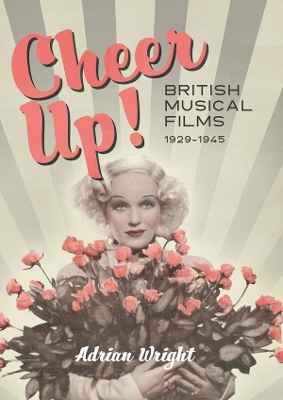Cheer Up! is the first book to deal exclusively with the British musical film from the very beginning of talking pictures in the late 1920s through the Depression of the 1930s up to the end of World War II. The upsurge in production at British studios from 1929 onwards marked the real birth of a genre whose principal purpose was to entertain the British public. This endeavour was deeply affected by the very many emigres escaping Nazi Germany, who flooded into the British film industry during this decade, as the genre tried to establish itself.
The British musical film...Read more
Cheer Up! is the first book to deal exclusively with the British musical film from the very beginning of talking pictures in the late 1920s through the Depression of the 1930s up to the end of World War II. The upsurge in production at British studios from 1929 onwards marked the real birth of a genre whose principal purpose was to entertain the British public. This endeavour was deeply affected by the very many emigres escaping Nazi Germany, who flooded into the British film industry during this decade, as the genre tried to establish itself.
The British musical film in the 1930s reflects a richness of interest. Studios initially flirted with filming what were essentially stage productions plucked from the West End theatre but soon learned that importing a foreign star was a box-office boost. Major musical stars including Jessie Matthews, Richard Tauber and George Formby established themselves during this period. From its beginning, the British musical film captured some of the most notable music-hall performers on screen, and its obsession with music-hall persisted throughout the war years. Other films married popular and classical music with social issues of poverty and unemployment, a message of social integration that long preceded the efforts of the Ealing studios to encourage a sense of social cohesion in post-war Britain. The treatmentof the films discussed is linear, each film dealt with in order of its release date, and allowing for an engaging narrative packed with encyclopaedic information.
The British musical film in the 1930s reflects a richness of interest. Studios initially flirted with filming what were essentially stage productions plucked from the West End theatre but soon learned that importing a foreign star was a box-office boost. Major musical stars including Jessie Matthews, Richard Tauber and George Formby established themselves during this period. From its beginning, the British musical film captured some of the most notable music-hall performers on screen, and its obsession with music-hall persisted throughout the war years. Other films married popular and classical music with social issues of poverty and unemployment, a message of social integration that long preceded the efforts of the Ealing studios to encourage a sense of social cohesion in post-war Britain. The treatmentof the films discussed is linear, each film dealt with in order of its release date, and allowing for an engaging narrative packed with encyclopaedic information.
- ISBN10 1783274999
- ISBN13 9781783274994
- Publish Date 15 May 2020
- Publish Status Active
- Publish Country GB
- Publisher Boydell & Brewer Ltd
- Imprint The Boydell Press
- Format Hardcover
- Pages 395
- Language English
